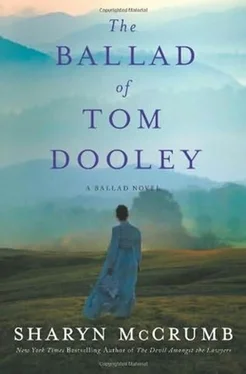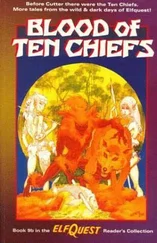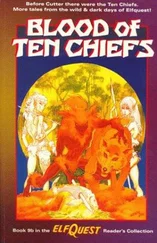“It’ll be a year midsummer,” said Ann, but her smile faded as she looked at me, for my speaking up had reminded her that I was watching them. She narrowed her eyes, and said, “Well, this standing around isn’t getting your chores done, Pauline. When you see to that hen, there’s washing to be done.” She looked up at Tom. “James is in the house, cobbling right now. Let’s you and I go talk in the barn where it’s warmer.”
I went back into the hen yard, watching them hurry, arm in arm, toward the barn, and I was thinking, “It’ll be warm enough wherever the two of you fetch up.” But it was all the same to me who Ann chose to carry on with. I couldn’t see anything special about this boy, worth making such a fuss over. But a minute or two later, as I wrung that chicken’s neck, I found myself thinking of the two of them entwined together in the hayloft, and, when the wind eased up a bit, I fancied I could hear laughter and soft voices.
***
We finally did get around to visiting the neighbors. The early March weather was still harsh, but it was a fallow time for farms, and people were naturally tired of having been cooped up all winter. They began to host get-togethers at one house or another through the rest of the winter. These occasions weren’t fancy parties: just a couple of old fellows sawing away on a homemade fiddle or a mandolin, while jugs of corn liquor, clear as water, passed from hand to hand, to fuel the talking. There was dancing, too, but not enough young men to make much of a go of it. People wore their ordinary everyday clothes: there were no fancy ball gowns or silk cravats to be seen at a Happy Valley party. Why, even the soldiers’ uniforms I’d seen at a dance or two back during the War had been more elegant than this, and the gaiety seemed a notch below the soldiers’ merry-making, too, but I understood that. The soldiers were drowning out thoughts of the morrow, knowing that they might be dancing their last reel, or seeing a willing girl for the last time. Such darkness as that had forced them to raucous revelry. The fever pitch was lacking in the festivities of a winter gathering in a world that was now peaceful, but poor-and missing some of those boys who would never come home.
I wore my best calico, which was clean but faded, and had seen me through most of the War. There were some women better turned out than me, but I am twenty and tiny, which counts for much. I did not lack for partners when I cared to dance. Even the fat old ladies and the scrawny war widows were not left wallflowers, for there was no belle of this ball, except my cousin Ann, who was no favorite among her own sex, but by the menfolk she was much desired. I don’t say they thought well of her, but they would have taken any favor from her she cared to bestow, and no one seemed to mind James Melton’s presence among the watchers.
I did meet the other Tom-Ann’s brother, Tom Foster-among the congregation at the dance. This Tom was a gawky, raw-boned boy, a couple of years younger than Ann, and not a patch on her in looks, but then, knowing the reputation of Lotty Foster, their mother, the two of them might have had different fathers to account for the lack of family resemblance.
When the dancing commenced, Tom Dula played the fiddle alongside the mandolin player for a reel or two, which called to my mind that he had been a company musician in the army. He played well enough, I suppose, but not as if he’d practiced or cared much for the skill of it, but only because music-making happened to be a thing that came easily to him. I don’t think he ever bothered with anything that didn’t come easy. He didn’t keep at it long, and he seemed to prefer the moonshine to the merry-making, same as I did. I spent most of the evening within arm’s reach of the whiskey jug, and sitting on a bench with a gaggle of older ladies, because I wanted to know more about Cousin Ann, and I judged that not much went on in the settlement that those old cats didn’t know about, so I sipped ’shine and listened, and every now and then I would drop a word into the stream of talk, to set the current off in the right direction.
Once, when Ann hauled Tom to his feet and made him partner her in a quadrille, I remarked to no one in particular, “They make a fine pair, do they not? What a shame that Ann did not meet Tom Dula soon enough to make a match of it.”
With a short bark of laughter, the white-haired lady beside me said, “Why, they had ample opportunity. Those two have knowed each other all their lives.”
“And been sweet on one another near ’bout that long,” said Betsy Scott. “Lotty Foster used to tell about the time she caught Tom Dula buck naked in Ann’s bed. She said she run him off with a broom.”
The two old ladies looked at each other across me, and I could hear them thinking, “Lotty Foster is a fine one to be upholding chastity,” for it was common knowledge in the settlement that Lotty herself could be had for the price of a drink. I had been thinking that Ann married young to get away from the sight of that at home, but now I thought I might have been wrong about that.
The ladies were still reminiscing about the long and close acquaintance of Tom Dula and Ann Foster. “When Lotty caught them in bed… that would have been before the War, wouldn’t it, Betsy? Yes, I thought as much. So Tom he couldn’t have been much more than fourteen.”
As the talk flowed around me, I watched the two of them, Tom and Ann, laughing, as they clasped hands and skittered down the row of dancers to take their place at the end of the line. Ann’s face was alight with the heat of dancing, or perhaps with the joy of being partnered with Tom. I had never seen such a look about her in the vicinity of James Melton.
“Why didn’t she marry up with him, then?” I wondered aloud.
Mrs. Scott shook her head. “Marry a boy of fifteen? Why, it was not to be thought of. James Melton had land and a roof over his head. At fifteen Tom Dula had none of that, and lo these seven years later, I am bound to say he still doesn’t.”
“And never will,” said her companion in scandal.
Mrs. Scott nodded. “Like as not. Ann wanted to get shut of her mother’s house, with all of those young’uns underfoot. If she had married Tom, she might still be stuck living with her mama-or with his’n, and where’s the escape in that?”
The white-haired woman laughed. “Anyhow, I don’t reckon Ann Melton would have to marry Tom Dula to get what he’s good for. Any woman in these parts can have that for the asking. And there have been enough of them ready to ask-including Ann herself, to this day.”
I kept staring at the dancers. The fiddlers had taken up another tune, and Tom and Ann, still hand in hand, had set off dancing again. I looked around the room, trying to spot Ann’s husband in the crowd, and, by and by, I placed him over in the corner, sitting with the older men who favored drinking over dancing.
I nudged Mrs. Scott, and nodded my head toward James Melton. “He doesn’t mind?”
“Does he mind?” Mrs. Scott turned to stare at me, as if I was a mule she was looking to buy. “You’d know that as well as anybody, wouldn’t you, Pauline? Aren’t you working over to their place these days? How does it strike you?”
I shrugged. “Like he hardly knows what’s going on around him,” I said. “I got to wondering if he had ever got kicked in the head by a mule.”
Betsy Scott laughed. “Better if he had been. He is so far under the spell of your pretty cousin Ann that some folks around here are saying she’s a witch.”
She got up to fill her cup just then, but I kept turning her question over in my mind. Ann and James Melton. They got along well enough, as married people do-like two yoked mules, obliged to plow the field together. They get along by getting on with the work, and not worrying about what their feelings may be toward one another. But, as far as I could see, that’s all there was between them-two yoked people getting on with the work of living. Keeping body and soul together on a scraggly hill farm in the aftermath of that war was enough to keep anybody’s mind set on the furrow straight ahead, for neither food nor money was easy to come by these days. I’d have thought no more about it, if I hadn’t seen the way Ann looked at Tom-a look that said being cold and starving were trifling matters compared to the fever of wanting him.
Читать дальше












